The decision above (or below, corresponding to the official PDF) suggests that the EPO is indeed reducing salaries of the accused, which limits their ability to pay legal fees and properly defend themselves from a heavy-pocketed institution with a vendetta.
The document is long, but we have read it from start to finish and also downloaded a snapshot of the page, as HTML (warning: utilises remote files from epo.org), before it was taken down. Our HTML version that can be found below is basically very similar; it is based on the PDF and includes pagination.
They might as well bring it back online. g230115.pdf and its text are already circulating online (IP Kat was the first to publicise it) and people have already downloaded the information, hence they can upload it at any time. Some of the ‘evidence’ in the case has been redacted, but nonetheless it is readable:
Internal distribution code:
(A) [ ] Publication in OJ
(B) [X] To chairmen and members
(C) [ ] To chairmen
(D) [ ] No distribution
Datasheet for the decision
of 17 September 2015
Case number: Art. 23 1/15
Language of the proceedings: EN
Petitioner:
Administrative Council of the European Patent Organisation
Respondent:
…
Headword:
Request for a proposal of removal from office
Relevant legal provisions:
EPC Art. 22, 23(1), 24(3), (4), 113(1), 117(1)
EPC R. 13
RPEBA Art. 2(5), 12a, 13, 14(2), (4), 18(3)
BDS/EBA Art. 1, 2, 10
ServRegs Art. 14(1), 20(1), (2), 93, 102(3)
Rules of procedure of the Administrative Council Art. 4
EPO Form 3030
C10474.D
This datasheet is not part of the decision.
It can be changed at any time and without notice.
- 2 -
Keyword:
“Request from the Administrative Council for a proposal that a
member of the boards of appeal be removed from office under
Article 23(1) EPC”
“Composition of the Enlarged Board of Appeal in proceedings
under Article 23(1) EPC”
“Requirements in terms of reasons and substantiation to be
fulfilled by a request under Article 12a(5) RPEBA”
“Reimbursement of all the respondent’s procedural costs
proposed”
Decisions cited
G 0006/95
Headnote:
1. The law-making bodies have so shaped the proceedings for a
decision for a proposal under Article 23(1) EPC that they
take proper judicial form. The arrangements laid down in
Articles 2(5) RPEBA and Article 10 BDS/EBA for the
composition of the Enlarged Board of Appeal in proceedings
under Article 23(1) EPC are compatible with the European
Patent Convention and general principles of law.
2. Article 12a(5) RPEBA requires that the request under
Article 12a(1) RPEBA specify individual incidents and the
evidence for them, and give reasons why they constitute a
serious ground within the meaning of Article 23(1) EPC.
Case number: Art. 23 1/15
D E C I S I O N
of the Enlarged Board of Appeal
of 17 September 2015
Petitioner: Administrative Council of the
European Patent Organisation
Bob-van-Benthem-Platz 1
D-80469 Munich (DE)
Representatives: …
European Patent Office
Bob-van-Benthem-Platz 1
D-80469 Munich (DE)
Respondent: …
Representative: …
Composition of the board:
Chairman: I. Beckedorf
Members: K. Klett
A. Dimitrova
M.-B. Tardo-Dino
E. Dufrasne
U. Oswald
H. Meinders
C10474.D
- 2 -
Summary of facts and submissions
I. These proceedings concern the request of 25 June 2015
(hereinafter: AC request) from the chairman of the
Administrative Council of the European Patent
Organisation (hereinafter: the petitioner) for a
proposal that the respondent be removed from office as
a member of the boards of appeal under Article 23(1),
first sentence, EPC and the rules of procedure of the
Enlarged Board of Appeal (RPEBA) as approved by the
Council on 25 March 2015 (CA/D 3/15).
II. In the AC request, the petitioner referred to the
Council’s decision of 26 March 2015 (CA/28/15,
item 10.1, page 5) to initiate disciplinary proceedings
against the respondent, and said he had just received
the opinion of the Council’s Disciplinary Committee
(hereinafter: DC) recommending the respondent’s removal
from office.
He added that the DC’s opinion was an integral part of
the AC request, and that the documents provided to the
DC – available on a USB stick and including the facts,
arguments and evidence on which they were based – would
be submitted in due course. He also indicated that the
Council would be represented in the proceedings by …
Concluding, he said he expected to receive the
information about how the Enlarged Board assessed the
case in time for the Council to take a final decision
at an extraordinary meeting planned for early September.
C10474.D
- 3 -
III. … [summary of the confidential DC’s opinion – added
for ease of understanding]
IV. … [summary of the confidential DC’s opinion – added for
ease of understanding]
V. On 29 June 2015, the Enlarged Board received several
copies of the USB stick promised by the Council
chairman in the AC request.
VI. On 30 June 2015, following receipt of the AC request,
the composition of the Enlarged Board to hear the case
was determined, and by letter of 2 July 2015 the
petitioner and the respondent (hereinafter: the parties)
were summoned to attend oral proceedings on 4 and
5 August 2015 and the respondent was set a time limit
of Monday, 27 July 2015 for making any written
submissions. In addition, the Vice-President in charge
of Directorate-General 3 (Appeals) (hereinafter: VP3)
was invited to comment under Article 12a(2) RPEBA. He
submitted substantive comments on 22 July 2015.
VII. In submissions received on 15 July 2015 the respondent
made several procedural requests and argued that the
AC request was not admissible.
VIII. By letter of 17 July 2015, the then chairwoman of the
Enlarged Board said in response to the admissibility
objections, without prejudice to the Enlarged Board’s
subsequent decision, that the facts to be regarded as
forming the basis for the AC request were limited to
those considered in the DC’s opinion of 23 June 2015
C10474.D
- 4 -
IX. and that as a consequence the USB-stick material
referred to in the AC request could not be used to
extend the proceedings to new issues.
X. On 20 July 2015 the respondent made further submissions
to the Enlarged Board, inter alia repeating his
objections that the AC request was inadmissible. In
particular, the subject-matter of the proceedings was
still not clear, as the AC request referred to facts,
arguments and evidence on the USB stick, and the
procedural papers included documents relating to
allegations dismissed by the DC and stored somewhere on
that data carrier.
XI. … [procedural aspects – added for ease of understanding]
XII. On 28 July 2015 the respondent filed an objection
against the then chairwoman under Article 24(3) EPC.
XIII. On 5 August 2015 the Enlarged Board took an
interlocutory decision under Article 24(4) EPC allowing
this objection and appointing a new member of the
Enlarged Board in her place.
XIV. The (main) proceedings were structured as follows:
first, the procedural issues raised by the respondent –
notably the admissibility of the AC request – would be
discussed and considered in initial oral proceedings;
then, if the request was admissible, the substance of
the allegations would be addressed.
C10474.D
- 5 -
XIII.1 Oral proceedings to decide on the AC request’s
admissibility were appointed for 16 and 17 September
2015.
XIII.2 To prepare for these oral proceedings, the Enlarged
Board informed the parties by written communication of
14 August 2015 under Articles 12a, 13 and 14(2) RPEBA
that the following issues in particular would be
addressed:
(1) The respondent’s argument that Article 2(5) RPEBA
was not compliant with Article 23(1) EPC
(point 2.1 of the communication)
(2) His argument that the AC request was inadmissible
on four grounds, namely
(a) the Council chairman had no mandate to make it
(point 2.2(a))
(b) it was not substantiated (point 2.2(b))
(c) it was premature (point 2.2(c)) and
(d) the DC’s opinion contained serious
deficiencies (point 2.2(d)).
(3) The communication also mentioned (point 2.3) the
respondent’s requests that the proceedings be
stayed and (point 2.4) a public hearing held.
XIII.3 Written comments for the oral proceedings were filed by
the respondent on 10 September 2015, and by the
petitioner’s representatives on 15 September 2015.
XV. At the oral proceedings, on 16 September 2015, the
respondent confirmed his request that the AC request be
rejected as inadmissible.
C10474.D
- 6 -
The petitioner’s representatives requested that the
AC request be found admissible, and that substantive
proceedings under Article 23(1) EPC be started.
XVI. The parties commented on the individual issues, in the
order of their presentation in the communication of
14 August 2015.
In reply to a question from the chairman, the
respondent confirmed that his request for a public
hearing applied only to any consideration of the merits
of the AC request, not to the admissibility issues. He
withdrew his request for a stay.
After discussing at length with the parties the facts
and the law concerning the admissibility of the
AC request, the Enlarged Board closed the debate and
adjourned the oral proceedings for deliberation.
XVII. After this internal deliberation, the Enlarged Board
resumed the oral proceedings on 17 September 2015.
The chairman informed the parties that the Enlarged
Board regarded the AC request as inadmissible.
The petitioner’s representatives thereupon asked the
Enlarged Board to reopen the oral proceedings on
admissibility, so that the petitioner could make the
following request:
“The Enlarged Board of Appeal shall inform the Council
representatives what exactly it wishes to receive from
C10474.D
- 7 -
the Administrative Council in order to proceed with a
substantive examination of the request for a proposal
for removal from office of the respondent.”
The respondent said this request should not be granted.
After discussion with the parties and internal
deliberation, the Enlarged Board refused it.
XVIII. The parties were then heard regarding costs.
XIX. The parties’ final requests were as follows:
XVIII.1 As per the AC request initiating these proceedings, the
petitioner wanted the Enlarged Board to
1. make a proposal to the Council for the
respondent’s removal from office as a member of a
board of appeal pursuant to Article 23(1) EPC
and, during the oral proceedings, it asked the Enlarged
Board to
2. reject the respondent’s admissibility objections
to the AC request
3. proceed with the examination of the substance of
the AC request, and
4. dismiss the respondent’s request for
reimbursement of costs or, failing that, limit
any cost reimbursement to the debate on
admissibility and to legal fees under German law.
C10474.D
- 8 -
XVIII.2 The respondent asked the Enlarged Board to
1. dismiss the AC request as inadmissible, and
2. propose to the Council that all costs incurred by
the respondent in the proceedings be reimbursed.
XX. At the end of the oral proceedings and after internal
deliberation, the chairman announced the Enlarged
Board’s decision as set out in the Order.
Reasons for the decision
Preliminary remarks
1. The title of Article 23 EPC is “Independence of the
members of the Boards”. Under Article 23(1) EPC, members
of the boards of appeal, whose function as judges is
generally recognised, are appointed for a term of five
years and may not be removed from office during this
term unless there are serious grounds for such removal
and the Administrative Council, on a proposal from the
Enlarged Board of Appeal, takes a decision to that
effect.
2. Under Article 23(4) EPC, the rules of procedure of the
boards of appeal and the Enlarged Board of Appeal are
adopted in accordance with the Implementing Regulations.
They are subject to the approval of the Administrative
Council. Under Rule 13(2) EPC, the RPEBA are adopted by
the (internal) members of the Enlarged Board appointed
under Article 11(3) EPC.
C10474.D
- 9 -
Under these provisions, by decision of 25 March 2015
(CA/D 3/15), the Council approved amendments to the
RPEBA which had been adopted by the Enlarged Board on
19 March 2015.
3. Article 2(5) RPEBA governs the Enlarged Board’s
composition in proceedings under Article 23(1) EPC. It
provides that in such cases the Enlarged Board is
composed according to the provisions of Article 22(2),
first sentence, EPC, the chairman being replaced by his
alternate and two of the legally qualified members being
external members.
More details about deputising for the chairman and the
Enlarged Board’s composition in specific cases are set
out in Article 10 in conjunction with Articles 1(2)
and 2(1)(a) and (b) of the Enlarged Board’s business
distribution scheme (hereinafter: BDS/EBA).
The respondent’s admissibility objections
4. These objections come under three headings:
a) Unlawfulness, i.e. the composition of the Enlarged
Board under Article 2(5) RPEBA was incompatible with
Article 23(1) EPC and general principles of law (see
section 5 below)
b) Procedural, i.e. the Council chairman and the
petitioner’s representatives were not duly authorised,
the disciplinary proceedings were premature, and the
disciplinary proceedings and the DC’s opinion were
flawed (see section 6 below), and
C10474.D
- 10 -
c) AC request, i.e. it was not properly substantiated
(see section 7 below).
Unlawfulness objections
5. The respondent objects that the present Enlarged Board’s
composition is incompatible with the EPC and general
principles of law. As already stated in the Enlarged
Board’s communication of 14 August 2015 (in its
point 2.1), this objection does not withstand incidental
legal review of compatibility with Article 2(5) RPEBA
(and thus implicitly also with Article 10 BDS/EBA).
5.1 The EPC contains provisions concerning the powers and
proceedings of the Enlarged Board. They state that the
Enlarged Board is responsible for ruling on points of
law referred to it by a board of appeal or the President
(Article 22(1)(a) and (b) EPC), or on petitions for
review requested by a party under Article 112a EPC
(Article 22(1)(c) EPC).
5.2 For Enlarged Board rulings under Article 22(1) EPC,
Article 22(2) EPC provides that in proceedings under
paragraph 1(a) and (b) the Enlarged Board consists of
five legally and two technically qualified members, and
in proceedings under paragraph 1(c) of three or five
members. However, the Enlarged Board’s composition for a
proposal for the exceptional situation of a removal of a
board member from office under Article 23(1) EPC is not
regulated in the EPC itself.
In particular, the EPC does not stipulate that a
proposal to remove a board member from office on serious
C10474.D
- 11 -
grounds under Article 23(1) EPC is to be decided on by
the full Enlarged Board (i.e. consisting of all its
internal and external members under Article 1 BDS/EBA).
This cannot be inferred in particular from the provision
as worded, because what Article 22 EPC refers to as the
“Enlarged Board of Appeal” are boards of varying (but in
any case limited) compositions.
5.3 Nor therefore can it be inferred from the words
“Enlarged Board of Appeal” in Article 23(1) EPC that a
proposal to remove a member on serious grounds must be
decided on by the Enlarged Board in its entirety. Rather,
the rules governing its composition are to be adopted by
the bodies responsible for the corresponding
implementing provisions, as expressly laid down in
Article 23(4) EPC.
5.4 In the institutional structure of the European Patent
Organisation, the Council as a body is responsible above
all for adopting secondary legislation where the
contracting parties to the EPC have not done so
themselves (Article 33 EPC). At the Enlarged Board’s
request (Article 23(4) EPC, Rule 13(2) EPC), it has
decided that proceedings under Article 23(1) EPC are to
be conducted in proper judicial form.
Thus it is up to the Council, as the appointing and
disciplinary authority for board of appeal members
(Article 11(3) and (4) EPC), or to VP3 as the vice-
president in charge of the boards, to make a request to
the Enlarged Board (Article 12a(1) RPEBA). This sets in
train adversarial proceedings to which the respondent is
a party (Article 12a(4) RPEBA). He must be able to
C10474.D
- 12 -
comment on the allegations made against him and regarded
by either his appointing authority or administrative
superior as so serious as to justify his removal from
office. Article 12a(6) RPEBA expressly states that the
proceedings may not be concluded without the respondent
being informed of the facts, arguments and evidence
underlying the request and having had the opportunity to
be heard on them. It also says that in these proceedings,
which are conducted in writing, supplemented if
necessary by oral proceedings, he may be represented or
advised. Given the reference to Article 117(1) EPC,
which lists the means of giving or obtaining evidence,
the Enlarged Board must satisfy itself in proceedings
under Article 23(1) EPC that the allegations made
against a board member are indeed true.
5.5 Thus the proceedings which may lead to a board member’s
removal from office on serious grounds within the
meaning of Article 23(1) EPC take the form of a judicial
procedure. That means – contrary to the view expressed
by the petitioner’s representatives in the oral
proceedings – that it cannot be equated with an
administrative or executive-legislative activity. Since
it is not an administrative or executive-legislative
activity, the necessity of a full Enlarged Board of
Appeal (further subject to a quorum for taking decisions)
as foreseen for such activities by Rule 13 EPC is
neither given, contrary to the respondent’s opinion.
Rather, and logically enough, the legislative bodies
responsible have specified that for a decision on a
request under Article 23(1) EPC the Enlarged Board is
composed as laid down in Article 22 EPC for its judicial
C10474.D
- 13 -
proceedings. That the European Patent Organisation
bodies responsible for enacting implementing legislation
opted in Article 2(5) of the amended RPEBA for the
largest Enlarged Board composition possible for such
proceedings shows they attached due importance to
proposals under Article 23(1) EPC.
5.6 Article 23 EPC contains provisions which are intended to
ensure the “independence of the members of the boards”
in their work as judges. The independence of judges is a
principle which is recognised and applied in all member
states of the European Patent Organisation, as
corresponding to the very nature of the judicial
function. The provisions of the EPC concerning the
boards of appeal must therefore be interpreted in the
light of this general principle (G 6/95, OJ EPO 1996,
649, Reasons point 2).
There is certainly no indication that the procedure for
removing a member, as laid down in the RPEBA approved on
25 March 2015, could run counter to basic principles of
judicial independence generally recognised in the EPC
contracting states.
True, removing a judge is always problematic in terms of
judicial independence. The independence of legal
decision-making – traditionally ensured in democracies
primarily vis-à-vis the other state powers (legislative
and executive) – is jeopardised not only when a specific
decision is directly influenced but also and especially
if undue pressure is brought to bear on judges or if the
resources they need to actually do their work are
withheld. The possibility of removing an irksome judge
C10474.D
- 14 -
from office can thus be used to indirectly influence
decisions. That is why it is generally regarded as
crucial to judicial independence that judges cannot be
removed from office without special institutional
safeguards; this makes sure that removal is actually
objectively justified.
The above considerations certainly apply also to members
of the boards of appeal, who exercise a judicial
function that is generally recognised and derives
straight from the EPC.
Therefore, for disciplinary action against (professional)
judges in particular, the member states of the Council
of Europe – most of which also belong to the European
Patent Organisation – have as a rule set up state bodies
to be used in exceptional removal procedures laid down
by law. These bodies and procedures differ, however, so
there is no general institutional model which might
guide an international institution such as the European
Patent Organisation (see CEPEJ report No. 20 on
“European judicial systems – Edition 2014 (2012 data):
efficiency and quality of justice”, page 354 ff.;
Systèmes judiciaires européens. Efficacité et qualité de
la justice, Les Etudes de la CEPEJ no. 20, Edition 2014
(données 2012), page 369 ff.).
5.7 The rules implementing Article 23(1) EPC – as regards
powers and procedures for the exceptional removal of
board of appeal members – that have been adopted in the
RPEBA by the law-framing bodies responsible within the
European Patent Organisation are in line with said
provision’s object and purpose.
C10474.D
- 15 -
For the fact that a board member can exceptionally be
removed from office only on a proposal from the Enlarged
Board is intended to make sure that unsubstantiated or
groundless, made-up allegations cannot be used as a
pretext for getting rid of an irksome judge.
The Enlarged Board must satisfy itself, in adversarial
proceedings conducted in proper judicial form, that the
allegations made are indeed true, and so serious as to
require the judge’s removal from office. Only on the
basis of proceedings meeting that general yardstick for
justice can the Council take a decision that is so far-
reaching, both personally and institutionally. These
proceedings thus embody the legislative intent codified
in Article 23(1) EPC.
That other ways of implementing Article 23(1) EPC might
be conceivable does not mean there is no compliance with
the EPC.
5.8 The respondent also requests that all documents on the
procedure leading to the 25 March 2015 decision to amend
the RPEBA be disclosed to him. However, he has put
forward no evidence of any deficiencies in the
proceedings followed in compliance with the only
procedure foreseen by the EPC (see points 2 and 5.4
above).
5.9 The respondent’s objection that Article 2(5) RPEBA runs
counter to Article 23(1) EPC and general principles of
law is thus unfounded.
C10474.D
- 16 -
Procedural objections
6. The AC request asking the Enlarged Board to make a
proposal that a specified technical board of appeal
member be removed from office is signed by the chairman
of the Administrative Council.
The respondent argues that he had no power to do so, and
that the Council as a whole must decide to make such a
request, or delegate this task to its chairman – which
did not happen.
6.1 The EPC does not set out the Council chairman’s duties
in any detail.
The relevant chapter (Articles 26 to 36 EPC) provides
that the Council elects a chairman (and deputy chairman)
from among the EPO member states’ representatives and
their alternates, for a term of three years (Article 27
EPC), and his task is to convene the Council’s meetings
(Article 29(1) EPC). In addition, under Article 28 EPC
the Council can also elect a five-member Board and
assign duties to it in accordance with the rules of
procedure (Article 28(4) EPC).
Under Article 4 of the Council’s rules of procedure
(CA/D 8/06 as amended by CA/D 21/09, CA/D 10/12 and
CA/D 20/13), cited by the petitioner’s representatives,
the chairman is responsible for the work of the Council
and the exercise of its functions, and in particular for
presiding over its meetings.
C10474.D
- 17 -
From that, no delegation of the power to submit a
request for an Enlarged Board proposal within the
meaning of Article 23(1) EPC can be inferred.
6.2 Both parties cite the decision taken by the Council at
its 143rd meeting on 25 and 26 March 2015 (summary of
decisions, CA/28/15, item 10.1: follow-up to the
Council’s decision CA/D 12/14 – investigation report
CA/C 4/15).
At that meeting, the Council unanimously decided to
initiate disciplinary proceedings against an employee it
had appointed, who was suspected of misconduct. To that
end, an ad hoc Disciplinary Committee was to be set up,
tasked with delivering an opinion on whether or not the
employee had breached his obligations and, if so,
recommending an appropriate sanction for such breach.
The DC’s opinion and recommendation would then be
forwarded to the Enlarged Board, pursuant to Article 23
EPC, and to the EPO President, who would both give their
opinions – to be also submitted to the Council, which
would take the final decision.
6.3 … [observations of the Enlarged Board in respect of the
non-public document CA/C 4/15 - added for ease of
understanding]
6.4 … [observations of the Enlarged Board in respect of the
non-public document CA/C 4/15 - added for ease of
understanding]
C10474.D
- 18 -
Although neither the request nor the decision expressly
refers to the possible outcome of the proceedings before
the DC, it is apparent from the possible follow-up
measures that it was intended, “once the DC has issued
its opinion”, to make future arrangements “for the
Council to take an informed decision, bearing in mind
Article 23(1) EPC”, i.e. for the eventuality that the DC
found that misconduct justifying removal from office had
occurred.
…
As the Council, under item 10.1 of the summary of the
decisions it took at its 143rd meeting on 25 and
26 March 2015 (CA/28/15), not only initiated
disciplinary proceedings but also specified what would
happen once the DC’s report was available, it is to be
concluded that it agreed to its chairman’s proposal of
18 March 2015.
The Council’s decision of 25/26 March 2015 can thus be
understood to mean that, were the DC to propose
dismissal, it had mandated its chairman to submit to the
Enlarged Board a request for a proposal within the
meaning of Article 23(1) EPC.
6.5 Thus the Council did authorise its chairman to submit
the AC request to the Enlarged Board under Article 23(1)
EPC, and the respondent’s objection that the Council
chairman was not empowered to request a proposal for his
removal from office is unfounded.
C10474.D
- 19 -
6.6 This also means that the Council chairman had the power
to appoint and authorise representatives to act for the
petitioner in the proceedings before the Enlarged Board.
So this objection too must fail.
6.7 On the respondent’s further objection that continuing
the disciplinary proceedings prejudged the proceedings
under Article 23(1) EPC and that the petitioner should
have discussed the DC’s opinion in plenary session, with
all Council members present, and should also have heard
him under Article 102(3) ServRegs, the Enlarged Board
has already commented in its communication of 14 August
2015 citing Article 12a(8) RPEBA, which provides that
Enlarged Board proceedings are conducted independently
of any disciplinary or national proceedings.
That means that continuing the Council disciplinary
proceedings cannot prejudge the present judicial
proceedings. Rather, the former are formally concluded
only when the Council, as appointing and disciplinary
authority under Article 11(4) EPC, takes its decision.
It is (only) prior to that decision that a hearing under
Article 102(3) ServRegs must take place.
However, for the Council to apply to a board member the
most severe disciplinary sanction available (dismissal
according to Article 93(2)(f) ServRegs), Article 23(1),
first sentence, EPC requires that it must first have
received a proposal for their removal from office from
the Enlarged Board. But that does not change the
principle that administrative disciplinary proceedings
under Article 93 ff. ServRegs before the appointing
authority are separate from judicial proceedings before
C10474.D
- 20 -
the Enlarged Board, which is not the appointing
authority.
The objection that the disciplinary proceedings were
prejudicial must therefore fail. If the objection raised
against point 2.2(c) of the Enlarged Board communication
of 14 August 2015 is also to be understood as arguing
that the Council should first have discussed the outcome
of the disciplinary proceedings before taking a formal
decision to initiate proceedings under Article 23(1),
first sentence, EPC, then it concerns whether the
Council chairman (alone) had the authority to submit the
AC request. That matter was decided in the affirmative
in the previous section above.
6.8 The respondent’s further objection that the disciplinary
proceedings and the DC’s opinion were flawed would
involve both reviewing the disciplinary proceedings and
assessing the petitioner’s allegations that the
respondent has committed misconduct constituting a
serious ground within the meaning of Article 23(1),
first sentence, EPC.
It is quite clear from Article 12a(8) RPEBA, stating
that removal proceedings are conducted independently of
any disciplinary proceedings, and from the fact that
proceedings under Article 23(1), first sentence, EPC are
adversarial and conducted in proper judicial form, that
the purpose of the Enlarged Board proceedings is not to
conduct a formal review of the disciplinary proceedings;
on the contrary, they are conducted independently of the
disciplinary proceedings.
C10474.D
- 21 -
Assessing the allegations made against the respondent,
and deciding whether they give rise to a serious ground
within the meaning of Article 23(1), first sentence, EPC,
would go (well) beyond evaluating their admissibility;
it would mean examining their substance.
Therefore, this objection too fails to establish that
the AC request is inadmissible.
AC request-related objections
7. Proceedings before the Enlarged Board under Article 23(1)
EPC are regulated in Article 12a RPEBA.
7.1 A request for a proposal may be made by either the
Council or VP3 (Article 12a(1) RPEBA).
7.2 In either case, the request must set out all the facts,
arguments and evidence relied on, and all documents
referred to must be attached (Article 12a(5) RPEBA).
7.3 The procedure that may lead to a proposal from the
Enlarged Board for removal from office within the
meaning of Article 23(1) EPC takes the form of quasi-
judicial adversarial proceedings (see point 5.5 above).
The rules expressly state that the member who is the
subject of the request is a party to the proceedings as
respondent (Article 12a(4) RPEBA) and that the
proceedings may not be concluded without the respondent
being informed of the facts, arguments and evidence
underlying the request and having had the opportunity to
be heard on them (Article 12a(6) RPEBA). The proceedings
are then to be conducted in writing, if necessary
C10474.D
- 22 -
supplemented by oral proceedings, and the respondent may
be represented or advised (Article 12a(6) RPEBA).
Article 117(1) EPC on the taking of evidence is
applicable (Article 12a(7) RPEBA), and the proceedings
are to be conducted independently of any disciplinary or
national proceedings (Article 12a(8) RPEBA).
7.4 In adversarial inter partes proceedings, the parties,
and in this case the petitioner in particular, are
required to produce the facts and evidence and give
reasons why, from the petitioner’s perspective, the
facts adduced – and in its view proven – are so serious
as to warrant the respondent’s removal from office as a
member of a board of appeal. In adversarial proceedings
the respondent must have an opportunity to refute the
allegations. He must be able to comment on all the facts
adduced, to state his case in full awareness of the
allegations and to rebut any evidence. It is up to the
Enlarged Board to judge whether the specific facts
adduced are proven by the evidence produced and whether
the proven facts exceptionally warrant the exceptional
removal from office of the respondent.
7.5 However, the Enlarged Board is not there to define of
its own motion which facts may be derived from documents
and exhibits. The respondent is a party to the
proceedings and can exercise his full right to be heard
only if the facts held against him are explicitly
described.
7.6 The AC request does not say what facts are held against
the respondent. Instead it refers to the DC’s opinion
C10474.D
- 23 -
and declares it to be an integral part of the request
for a proposal.
In that opinion, the accusations made against the
respondent, substantiated by a huge volume of data and
documents …, are grouped into five allegations.
[summary of points 1 to 5 of the confidential DC’s
opinion - added for ease of understanding]
7.7 At the oral proceedings the petitioner’s representatives
expressly stated – and confirmed more than once when
asked by the Enlarged Board – that they maintained all
five of these allegations, which had been raised by the
Administration, i.e. the EPO and its departments, in
particular the investigative unit, in the disciplinary
proceedings against the respondent. Their view was that
the Enlarged Board had been presented with all the
evidence on the subsequently filed USB stick and so was
fully informed and in a position to form its own view of
the respondent’s conduct.
7.8 Under Article 12a(5) RPEBA, the request under
Article 12a(1) RPEBA must set out the “facts, arguments
and evidence relied on”.
The facts have to be described and presented clearly
enough for the respondent to be able to comment on them
in a fully informed manner.
The Enlarged Board must be able to satisfy itself that
the facts explicitly set out in the request are proven,
so as to judge on that basis whether they constitute
serious grounds within the meaning of Article 23(1),
C10474.D
- 24 -
first sentence, EPC and therefore warrant a proposal for
removal from office under Article 23(1) EPC.
7.9 As the AC request itself does not adduce any facts that
in the petitioner’s view warrant the extraordinary
removal from office of the respondent, those facts would
have to be explicitly set out within the meaning of
Article 12a(5) RPEBA in the DC’s report of 23 June 2015,
together with the supporting evidence.
7.10 Firstly, the five issues under which the DC dealt with
the evidence against the respondent constitute general
allegations which in turn rest at best upon specific
facts.
Thus the DC – without ultimately expressing a view on
the reliability of the evidence produced – concluded
under issue 1 that the respondent … and under issue 2
that he … [had committed certain acts he was accused of
- added for ease of understanding]
7.11 The DC’s opinion goes into these allegations in more
detail, but adduces no specific facts in relation to the
allegations grouped under issues 3 to 5 … [observation
of the DC in its confidential opinion – added for ease
of understanding]
With regard to allegations 3 to 5, the DC’s opinion
provides no facts at all which under Article 12a(5)
RPEBA are set out explicitly enough for evidential
purposes. Hence allegations 3 to 5 are not substantiated
for the purposes of the AC request.
C10474.D
- 25 -
7.12 Yet even with regard to the allegations that the DC
groups under issues 1 and 2, the facts and evidence are
not set out explicitly enough for the respondent to
comment on them, and for the same reason the Enlarged
Board is unable to reconstruct and examine them in order
to judge for itself, independently of the disciplinary
proceedings as required by Article 12a(8) RPEBA, whether
there are serious grounds within the meaning of
Article 23(1) EPC. As a result, they cannot be used for
evidential purposes under Article 12a(7) RPEBA and
Article 117(1) EPC.
Similar considerations apply to the DC’s assessment of
evidence merely generally outlined in the DC’s opinion
or of pure deductions from circumstantial evidence not
set out or proven in detail therein, none of which can
replace either substantiated argument or the production
of direct or circumstantial evidence.
… [observations of the Enlarged Board in respect of the
allegations under point 1 of the confidential DC’s
opinion - added for ease of understanding]
The specific facts held against the respondent must be
defined on the basis of the evidence indicated in the
DC’s opinion, to enable judgment to be made, in full
knowledge of the circumstances, as to whether they are
proven and relevant. It is not good enough to simply
refer to facts and evidence and leave the Enlarged Board
to reconstruct the events for itself. That does not
satisfy the requirements of Article 12a(5) RPEBA nor the
respondent’s right to know the charges against him.
C10474.D
- 26 -
7.13 The same applies to the allegations considered in
issue 2 of the DC’s opinion … [observations of the
Enlarged Board in respect of those allegations - added
for ease of understanding]
It does not however describe the individual acts of
which the respondent is accused; the Enlarged Board
would have to construe these from the evidence.
… [observations of the Enlarged Board in respect of the
allegations under point 2 of the confidential DC’s
opinion - added for ease of understanding]
Evidence that the respondent had sent … a message … was
found insufficient by the DC, so there is no need for
the Enlarged Board to entertain this allegation.
Lastly, the DC was satisfied – again by reference … –
that … the respondent wrote to … But again its report
does not actually reproduce the alleged insults, so the
respondent would not be able to comment on them under
Article 12a(6) RPEBA in adversarial proceedings before
the Enlarged Board.
7.14 Thus the AC request, taken as a whole, fails to fulfil
the formal requirements of factual substantiation
prescribed by Article 12a(5) RPEBA to ensure adversarial
proceedings in which compliance with parties’ generally
recognised procedural rights in judicial proceedings,
and impartiality on the part of the decision-making body,
are guaranteed.
C10474.D
- 27 -
7.15 At the oral proceedings the petitioner’s representatives
also expressed the view that the Enlarged Board should
have informed it beforehand, and more clearly, that
there might be admissibility issues with the AC request.
However, that disregards the fact that all the
admissibility objections discussed with the parties in
the oral proceedings and forming the factual and legal
basis for the present decision had already been raised by
the respondent, and were also mentioned again in the
Enlarged Board’s written communication of 14 August 2015
as material points for discussion.
So the petitioner’s representatives were – or could have
been – aware of these issues from the admissibility
objections explicitly raised and substantiated by the
respondent at the start of the proceedings, in his first
written submissions of 15 July 2015, and from his
unqualified request that the AC request be rejected as
inadmissible.
From the timetable explained to the parties at the oral
proceedings on 5 August 2015 (oral proceedings on
admissibility on 16 and 17 September 2015, and – if the
request was admissible – on the merits on 8 October 2015),
and at the latest on receipt of the Enlarged Board’s
communication of 14 August 2015 preparing the oral
proceedings of 16 and 17 September 2015, it was made
quite clear to all parties that the admissibility
objections were crucial to the decision.
In such circumstances, no further clarifications for the
parties – or for the petitioner alone – were called for.
C10474.D
- 28 -
7.16 Given this outcome, there is no need to consider the
respondent’s further objection regarding the
(in-)admissibility of the USB-stick evidence as
announced in the AC request but submitted only later,
not together with the request as required by
Article 12a(5) RPEBA.
7.17 The AC request is thus to be rejected as inadmissible.
Request to reopen the debate on the admissibility of the
AC request
8. The petitioner’s representatives’ request that this
debate be reopened was to be refused.
8.1 Firstly, all the admissibility issues set out in the
Enlarged Board’s communication of 14 August 2015 were
discussed with the parties in depth for over three and a
half hours on 16 September 2015.
That gave the parties the opportunity not only to
present their own positions on the facts and law but
also to comment on the opposing party’s submissions. The
Enlarged Board also questioned the parties to establish
further details and clarify their submissions.
When this discussion was over, the chairman closed the
debate on the AC request’s admissibility.
C10474.D
- 29 -
8.2 The petitioner did not dispute this in the requests it
made and substantiated orally, and then confirmed in
writing at the oral proceedings on 17 September 2015.
8.3 After the Enlarged Board had deliberated, when the oral
proceedings were resumed on 17 September 2015 its
chairman began by informing the parties of its
conclusions regarding the admissibility objections
discussed the previous day, expressly stating that this
was not yet a formal decision but the oral proceedings
would now continue with a discussion of the respondent’s
request for costs, which was still outstanding. It was
at this point that the petitioner’s representatives then
requested a reopening of the debate about the
AC request’s admissibility which had been closed the day
before.
8.4 In the grounds presented orally for this request and
reflected in the wording of the written request, the
petitioner’s representatives said they were making it
because they wanted the Enlarged Board to inform them
what exactly it wished to receive from the petitioner in
order to proceed with a substantive examination of the
request for a proposal for removal from office of the
respondent.
8.5 Under Article 14(6) RPEBA, a debate is reopened after
closure only at the Enlarged Board’s discretion, for
example if a procedural error material to the decision
has occurred, such as an infringement of the right to be
heard (Article 113(1) EPC).
C10474.D
- 30 -
Nor is the Enlarged Board under any general obligation
to offer pointers and explanations – especially if they
are sought with a view to giving one party in
adversarial proceedings a procedural advantage over the
other.
Rather, each party – itself, exclusively, and admissibly
– must make all the submissions on which its requests
are based. In the present proceedings, the admissibility
flaws set out above could not in any case have been
rectified afterwards, in the same proceedings. The
requirements under Article 12a(5) RPEBA for a request
under Article 12a(1) RPEBA must be fulfilled at the time
of its submission.
8.6 Thus it was not possible, for legal reasons, to accede
to the petitioner’s representatives’ request as worded
and substantiated.
Request and proposal on costs
9. Given the outcome of these proceedings, in the absence
of special circumstances, reimbursement under
Article 12a(10) RPEBA of all costs incurred by the
respondent in the proceedings before the Enlarged Board
is to be proposed.
The petitioner has given no convincing reasons why
reimbursement should be limited, and nor are any
otherwise apparent. As far as the petitioner’s
representatives argue that only legal costs under German
law should be reimbursed, and they should be limited to
C10474.D
- 31 -
those incurred on the issue of the AC request’s
admissibility, this is a matter of the costs’ actual
calculation and fixing, which are the petitioner’s
responsibility. However, the Enlarged Board would point
out that its former chairwoman’s order of 2 July 2015
instructed the respondent to present a defence against
all aspects of the AC request, not limiting in any way
the issues to be addressed, and that his written defence
in these proceedings covered the merits of the
AC request as well as its admissibility.
Order
For these reasons it is decided that:
1. The request of 25 June 2015 is rejected as inadmissible.
2. The reimbursement of all costs incurred by the respondent
in the proceedings before the Enlarged Board of Appeal is
proposed.
The Registrar
W. Crasborn
The Chairman
I. Beckedorf
C10474.D
The suspended DG3 member, or alternatively the “defendant” or “respondent” in this context, is already the victim of what looks like a defamation campaign. To quote this one comment:
“My intention was to do so (and I still have it) but some comments on IPkat have slightly cooled down my (good) intentions. I will do it using a proxy and/or the Tor browser.”
The atmosphere of fear has made anonymity somewhat of a prerequisite, which may explain why the judge is accused of (or alleged to have been) communicating anonymously. Well, anonymity in its own right is not a crime. It’s not identity theft or impostering. █


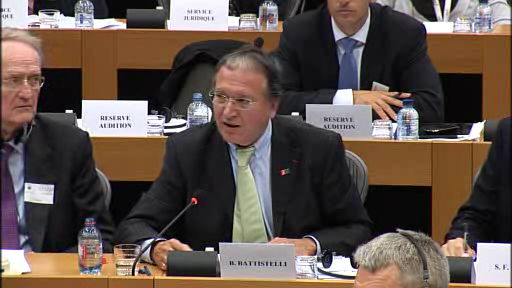
 All those years SUEPO was able to co-exist with the management, but it’s only Battistelli that could not tolerate such staff unions. He added to his team a
All those years SUEPO was able to co-exist with the management, but it’s only Battistelli that could not tolerate such staff unions. He added to his team a 
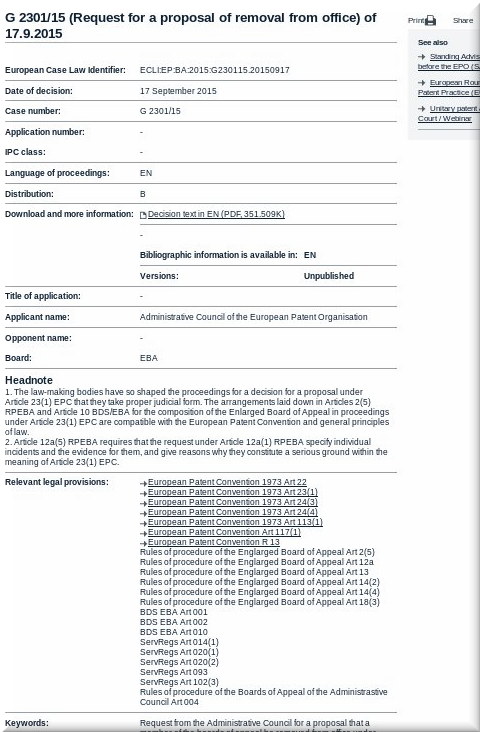
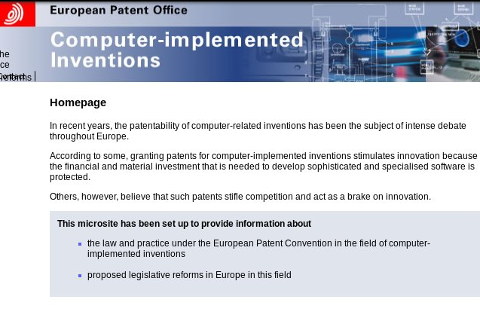
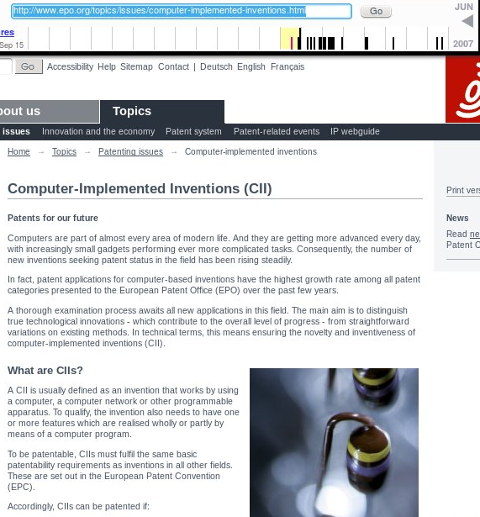
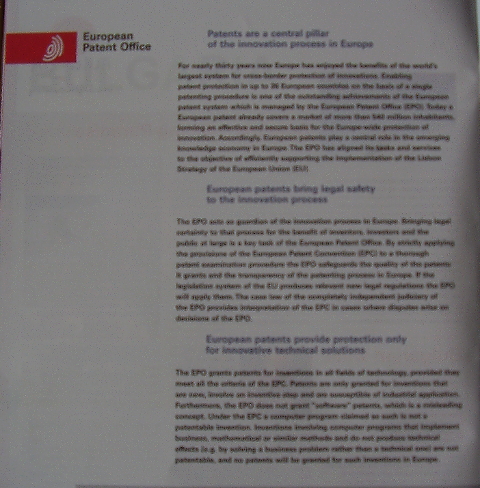


















 Content is available under CC-BY-SA
Content is available under CC-BY-SA